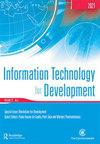Impacts of information and communication technologies on the SDGs: the case of Mayu Telecomunicaciones in rural areas of Peru
IF 5.1
3区 管理学
Q1 DEVELOPMENT STUDIES
引用次数: 8
Abstract
ABSTRACT Information and Communication Technologies (ICT) are considered a cross-cutting tool that contributes to meeting the global challenges set out in the Sustainable Development Goals (SDGs). However, in many countries, there is still a significant connectivity gap between cities and rural areas. Using a case study approach and the Digital-for-development paradigm proposed by Heeks, this paper explores an innovative strategy for addressing the rural connectivity gap and examines its impact on the SDGs. The model under analysis is the Rural Mobile Infrastructure Operator (RMIO). The specific case analyzed is the first company operating under an RMIO figure and offering services in underserved rural areas of Peru. The results show that the RMIO strategy primarily contributes to some specific targets of SDGs 3, 9, and 17. Key stakeholders can use the methodology and results of this study to develop strategies to address the connectivity divide and promote the achievement of the SDGs in rural contexts.信息和通信技术对可持续发展目标的影响:秘鲁农村地区Mayu Telecomunicaciones的案例
信息通信技术(ICT)被认为是一种跨领域工具,有助于应对可持续发展目标(sdg)中提出的全球挑战。然而,在许多国家,城市和农村地区之间的连通性仍然存在巨大差距。本文采用案例研究方法和Heeks提出的数字化促发展范式,探讨了解决农村连通性差距的创新战略,并考察了其对可持续发展目标的影响。所分析的模型是农村移动基础设施运营商(RMIO)。所分析的具体案例是第一家在RMIO数字下运营并在秘鲁服务不足的农村地区提供服务的公司。结果表明,RMIO战略主要有助于实现可持续发展目标3、9和17的一些具体目标。关键利益相关者可以利用本研究的方法和结果制定战略,以解决连通性鸿沟,并促进在农村环境中实现可持续发展目标。
本文章由计算机程序翻译,如有差异,请以英文原文为准。
求助全文
约1分钟内获得全文
求助全文
来源期刊

Information Technology for Development
Multiple-
CiteScore
11.30
自引率
16.70%
发文量
34
期刊介绍:
Information Technology for Development , with an established record for publishing quality research and influencing practice, is the first journal to have explicitly addressed global information technology issues and opportunities. It publishes social and technical research on the effects of Information Technology (IT) on economic, social and human development. The objective of the Journal is to provide a forum for policy-makers, practitioners, and academics to discuss strategies and best practices, tools and techniques for ascertaining the effects of IT infrastructures in government, civil societies and the private sector, and theories and frameworks that explain the effects of IT on development. The concept of development relates to social, economic and human outcomes from the implementation of Information and Communication Technology (ICT) tools, technologies, and infrastructures. In addition to being a valuable publication in the field of information systems, Information Technology for Development is also cited in fields such as public administration, economics, and international development and business, and has a particularly large readership in international agencies connected to the Commonwealth Secretariat, United Nations, and World Bank.
 求助内容:
求助内容: 应助结果提醒方式:
应助结果提醒方式:


